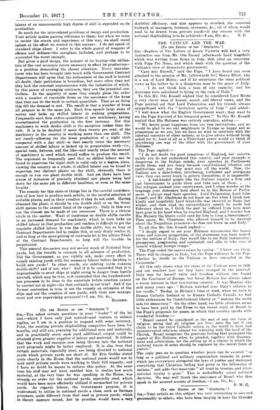THE VATICAN AND TILE WAR.
[To me Emma or Tan n Sereraos."]
Sia,—Readers of The Letters of Queen Victoria will find a very instructive one from Mr. Odo Russell (afterwards Lord Ampthill) which was written from Rome in July, 1859, after an interview wills Pope Pio Nom, and which deals with the question of the Vatican's view of democratic government.
" Caro mio Russell," said the Pope, "I have heard you were attached to the mission of Mr. [afterwards Sir] Henry Elliot, who is a son of Lord Iffmto; and if he entertains the lame political views as his father he is a dangerous man to the peace of Italy. . . . I do not think him a man of any capacity, and his doctrines were calculated to bring on the ruin of Italy." To this Mr. Odo Russell replied that he considered Lord Mints a very clever man of honest, sound, and liberal views, and the Pope pointed out that Lord Palmerston and his friends always sympathized with the "turbulent spirits of Italy" and added: "I well know what the English Governnient want; they want to see the Pope deprived of his temporal power." To this Mr. Russell replied that His !feliness was entirely mistaken, adding " We derive great happiness from our free institutions, and we would be glad to see our neighbours in Europe as happy and as prosperous as we are, but we have no wish to interfere with the internal concerns of other nations, or to give advice without being asked for it; least of all se a Protestant power would are think of interfering one way or the other with the government of your Holiness."
The Pope replied :— " I do not doubt the good intentions of England. but unfortu- nately you do not understand this country and your example is dangerous to the Italian minds, your epeeolies in Parliament excite them, and you fancy because constitutional liberties and institutions suit you they must suit all the world. Now, the Raisins are a dissatisfied, interfering, turbulent and intriguing race; they can never learn to govern themselves, it is impossible. . . . A hot-headed people like the Italians require a firm and just Government to guide them and take care of them. . . Our refugees mislead your countrymen, and I often wonder at the language your etatesnsen hold about us in the Houses of Parlia- ment. I always read their speeches. Lord Palmereton, Lord John Russell, and Mr. Gladstone do not know us; but when I think how kindly and hospitably Lord Granville was received at Rome last winter, and then read the extraordinary speech he made last February about us, I think the gout he suffered from here meet have gone to his head when he reached England, and I wonder how Her Majesty the Queen could send for him to form a Government! Then again, Mr. Gladstone, who allowed himself to be deceived about the Neapolitan prisoners—he doee not know us and Italy."
To all this Mr. Odo Russell replied :— " I deeply regret to see your Holiness misconceive the homet views and sincere sympathiee, of the statesmen you have named, for the welfare of Italy; they would like to see Italy independent, prosperous, progressing and contented, and able to take core of herself without foreign troops."
The Pope ended the conversation by saying "I know one thing. There will be changes in Italy, but the Pope will ever be the Pope whether he dwells in. the Vatican or lives concealed in the Catacombs."
All this only shows what the views of the Vatican were in 1859,
and one wonders how far they hare changed in the interval. Italy won for herself unity and freedom without one friend on the Continent of Europe, but Great Britain has always taken a warm interest in that faecinating country. It was Mannini who said many years ago: " Britain watched over Italy's infancy in her cradle." To-day, in Britain's time of need, wires we turn to Roman Catholic Ireland or to Roman Catholic Canada we find little enthusiasm for Constitutional liberty or "making the world safe for democracy," On the other hand, too little attention seems to have been paid by the Press to the recent reply of Brazil to the Pope's proposals for peace, in which that country speaks with wonderful freedom :—
" Brazil cannot be considered as the seat of any one form of religion, seeing that all religious are free; none the less it ran claim to be the third Catholic nation in the world to hove had uninterrupted relations almost for centuries with the head of the Churoh. Brazil recogninos the generone feeling that prompted the appeal of His Holiness when he pleaded, together with disarma- ment and arbitration, for the setting up of a ,'dime in which the material forces of arms should be replaced by the moral force of justice."
The reply goes on to question whether peace can be assured "so long es a political and military organization remains in power which has everywhere abrogated the lawn of justice and destroyed everything that Christian feeling had given to the fellowship of nations," and adds that meantime" all trust in treaties and inter, national loyalty is gone." This is undoubtedly sound political doctrine. We may well thank the statesmen of Brasil who thus speak in the assured accents of freedom.—I am, Sir, &c., P. W. C.


































 Previous page
Previous page